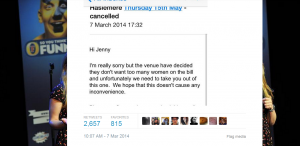Deeyah talks about her life, at Women News Network for International Women’s Day.
Her grandfather was a pillar of the Norwegian Muslim community, and very religious, a one-book guy. Her father went the opposite way.
For my grandfather, the only book worth reading was the Qur’an, but my father loved all kinds of books and music: cabinets bulged with vinyl LPs, bookshelves were crammed with works as diverse as histories of colonialism and the ancient civilizations of the Indus Valley, mythology, theatre and innumerable collections of Urdu poetry. From cramped student accommodation to a semi-detached house, this precious resource of human knowledge traveled with the family, growing ever larger. And this was not the only resource my father collected: our house was a gathering place for intellectuals and dissidents, often sharing their criticisms of General Zia a-Haq and his Islamization project for Pakistan in the 1980s.
Her mother was a teacher.
My mother was often busy making sandwiches for the immigrant children she taught, who otherwise might have gone hungry. She was an ocean of love, not just for us, but for everyone who needed it: she helped in women’s shelters, often with women who had been rejected by their own families. As a teacher, and as an interpreter, she helped people deal with their problems, unsparingly generous with her time and attention.
It was through her I first learned of women who were forced into marriages, who were beaten, and who kept their silence in the name of family ‘honour.’
Her father overheard her singing to herself one day and promptly got rid of all her toys and pushed her to excel at music as well as her studies. It sounds quite ferocious, but to her also worth it.
But to other people? That’s a different story.
In one respect, I felt that I was bridging divides; presenting a positive image of immigrants in Norway; and breaking down the stark divisions of us and them through music, shaking off the cruel slurs of my childhood. But to maintain this fiction I had to hide a different and unexpected source of hostility: that which came from my parents’ community.
This became more intense the more successful I became: a hardcore of fundamentalists identified women singing and working as agents against the doctrine of the four walls. First fundamentalists targeted my father, demanding that he prevent me from singing and performing publicly. When this failed, they moved on to my grandfather, a man with a reputation for piety, who they felt would be more sympathetic to their aims. But when it became clear that no male authority could stop me from singing, their aggression came squarely at me.
On one occasion, I was threatened with a knife, and on another, a failed abduction attempt. My discomfort around performance was doubled by the sense of threat and surveillance, most pointedly at an anti-violence concert in Oslo. It was my home-town and many of my friends were in the audience, so I was determined to put on a good show. A few songs into the set I could see fights breaking out at the back of the crowd. I moved towards the front of the stage, and some corrosive chemical was sprayed in my face and eyes. Blinded, I desperately tried to signal to my bandmates that I couldn’t see, turning my back to the audience, but they didn’t pick up on my signals. My eyes refused to open: tears ran down my neck. The pain was unbearable. I kept singing.
She left Norway at age 17 to escape that kind of thing. She made music. She got involved with things.
Emerging from a tunnel of anger and self-doubt, I found inside an activist as well as an artist. Linking with women’s rights activists recalled the passion and commitment of the Pakistani feminists gathered at my father’s house, so many years ago. The experiences of the attempts to suppress my music led me to take an active role in support of the Freemuse organization, who stand against the censorship of music, not just of those silenced by fundamentalists, but also those subjected to state persecution for their politics. Our first co-production was Listen To The Banned, a compilation CD of musicians who had persisted with their art through imprisonment, censorship and injury.
She made her award-winning documentary about the murder of Banaz Mahmod.
Through all of these stories and experiences, the connecting thread has been about personal liberty, whether to sing, to love, to study or to work according to the calls of one’s own heart, to realize our potential in the world, to raise our voices without fear. This is my vocation and my art, whatever form it may take, music, activism or filmmaking, and whatever follows.
My voice will be raised for human rights for as long as I have breath.
Thank you Deeyah.
(This is a syndicated post. Read the original at FreeThoughtBlogs.)



![Demonspawn [-1] 6 points 7 hours ago (26|20) Wearing a skirt has consequences. If we use state violence to protect women from the consequences of her choice to wear a skirt, we remove her agency. This man didn't assault her, didn't touch her... all he did was take a picture of what her choice in clothing exposed to the public. How is that criminal to the point of deserving of state violence upon him? This is saying that protecting women from the consequences of their choices in clothing is more important than men's freedom. permalink save source save give gold hide child comments [–]nigglereddit 5 points 6 hours ago (13|8) You're absolutely correct. If you wear clothing which exposes parts of your body from some angles, you have to expect that someone at that angle will see those parts of your body. You can't tell everyone not to see you from those angles because you're not comfortable with that part of your body being seen; that's ridiculous. If you're uncomfortable it is your job to cover that part of your body. permalink save source save parent give gold [–]DaNiceguy [-2] 4 points 4 hours ago (11|7) Ah but you see the wrong man saw it. That makes him a criminal, right?](http://manboobz.files.wordpress.com/2014/03/demonskirt.png?w=604)
